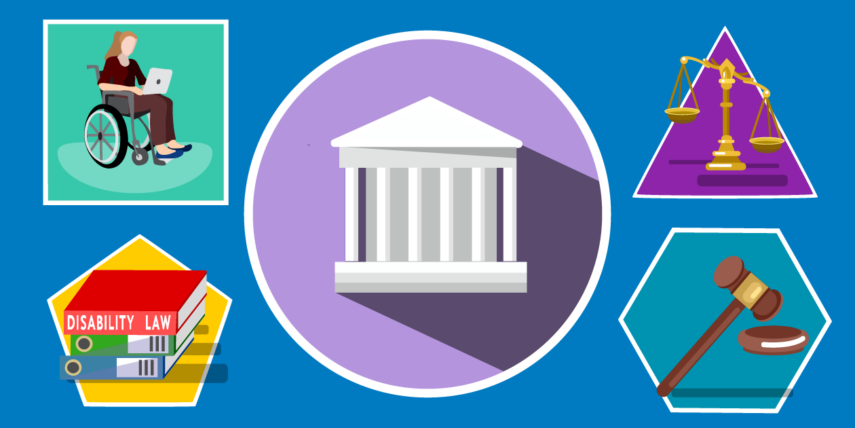Disability law is an ever-evolving field of law that focuses on the rights and privileges extended to individuals who have physical or mental disabilities. This branch of law helps those affected by disabilities to feel secure in the knowledge that their rights and protections are respected and honored, regardless of an individual’s unique circumstances. It also provides legal recourse in cases where such rights are violated.
Plenty of comprehensive resources exist for those who need help understanding their respective rights and protections under disability law. Here we will cover the basics so you can gain a better understanding of how this evolving branch of civil rights relates to you.
Definition of Disability Under the Law

Under the law, a disability is defined as any physical or mental impairment that substantially limits one or more major life activities of an individual (such as walking, talking, seeing, hearing, breathing, learning, and working). A person must have a disability in order to be protected under the law.
A person is also considered to have a disability if they have a history of a qualifying impairment (including having been diagnosed with or having had medical treatment for an impairment) or are regarded by other people as having an impairment. If you need help with handling legal aspects, visit this website.
An individual must meet all three criteria in order to qualify for legal protection and assistance. The criteria include:
- Having an impairment that is both medically diagnosable and significantly impacts one or more major life activities;
- Having been subjected to discrimination due to the perceived presence of such an impairment;
- Having faced unfavorable treatment because of real or perceived misperception of physical character attributes.
Accessibility for People with Disabilities
Accessibility for people with disabilities is recognized as an important and fundamental right. Under the Canadian Charter of Rights and Freedoms, people with disabilities are protected against discrimination. This includes physical, architectural, or other barriers that can prevent them from fully participating in all aspects of life.
The federal government has enacted several pieces of legislation to advance and protect the rights of people with disabilities in Canada. These include:
• The Accessible Canada Act, which outlines the government’s commitment to remove existing physical, communication, and attitudinal barriers that prevent people with disabilities from full participation in society;
• The Canadian Human Rights Act, which outlines the rights of all Canadians to equal treatment without discrimination;
• The Employment Equity Act, which recognizes persons with disabilities as a designated group entitled to equal employment opportunities; and
• The Canadian Charter of Rights and Freedoms, ensures that individuals have an equal measure of protection against discrimination due to physical or mental disability.
Employment Rights for People with Disabilities

Employment rights for people with disabilities are covered by several pieces of key legislation at both the federal and provincial levels. Canada’s human rights laws, disability laws, occupational safety, and health laws, unemployment insurance coverage and employment insurance coverage provide a range of protections for individuals with disabilities. Depending on where an individual resides in Canada, there may be additional or separate legislation to further reinforce these rights.
In addition to the above, the Employment Equity Act ensures that Canadians who identify as racialized persons, Indigenous peoples, persons with disabilities, or women have access to jobs free from systemic (or structural) barriers or any other form of discrimination. This includes hiring processes that need to be accessible and accommodating to persons with disabilities.
Where a job specifically calls for certain qualifications that individuals cannot meet due to a disability, employers must consider alternative qualifications should they be able to do so. Further still, federal and provincial law dictates that no one can be fired nor denied employment due solely to an individual’s being disabled; this is part of the protection against discrimination provided by Canadian human rights legislation.
Finally, employers are typically required (provincial/territorial-specific) to accommodate employees’ disabilities as reasonably possible up until undue hardship is imposed on them due to the accommodation process.
These exceptions will likely include undue financial costs; changes in collective agreements; the elimination of opportunities for other employees or monopolizing organizational resources for accommodating employees with disabilities; changes in work hours; termination of employment; or anything else which excessively disrupts normal operations within an organization– all of which must be articulated prior to denying accommodations requested by employees/applicants with disabilities.
Rights in Education
The right to inclusive education is protected under the Canadian Charter of Rights and Freedoms, which states that “every individual is equal before and under the law and has the right to equal benefit of its protection.” In addition, other federal laws prohibit discrimination on the basis of disability in educational contexts (e.g., Accessibility for Ontarians with Disabilities Act), provide support for students with disabilities (e.g., Persons With Disabilities Online Registration System [PDOR]), and promote equity in educational activities (e.g., Employment Equity Act).
Provinces are also required by law to ensure that public school programs meet certain standards for students with disabilities regarding equality of opportunity for appropriate instruction or other necessary learning experiences without discrimination based on race, national or ethnic origin, color, sex, religious beliefs, or activity.
In addition to providing these legal protections within school systems themselves provinces can also provide a variety of accommodations aimed at facilitating access to local amenities such as transportation assistance or extra classroom help.
This means people with disabilities have many rights when it comes to their participation in education programs at all levels – from kindergarten through post-secondary institutions and beyond – although implementation may vary from province to province depending on their own regulations and policies surrounding accessibility requirements. It’s important that people know their rights as they can help prevent unlawful discriminatory acts and encourage more accurate compliance in schools across Canada.
Benefits and Programs for People with Disabilities

The exact benefits and programs available vary depending on region and the type of disability. In all cases, the goal is to create a level playing field by helping people with disabilities pursue healthy, meaningful lives without facing additional financial burdens that don’t affect the general population.
Federal Benefits
The federal government offers programs and benefits to people living with a disability throughout Canada. These range from income support for disabled persons to increased tax credits for those who need additional services due to their disability.
Provincial/Territorial Benefits
Each province and territory have their own set of benefits for people with disabilities that can differ from the federal programs described above. These programs may include specialized medical services, employment training opportunities, extended health coverage, educational funding for students with disabilities, subsidized housing options, transportation assistance, and more.
Other Programs
Beyond provincial/territorial and federal offerings, there are other private organizations or charitable groups that may provide grants or other types of support for people living with a disability in Canada – such as extended healthcare services or support networks operated by charities or NGOs who collaborate with governments at all levels to offer increased help resources to those in need.
Conclusion

Knowing your rights and protections under disability law can help ensure that you have the same opportunities as everyone else. It’s important to understand how laws apply in different situations, so be sure to research and stay informed of any changes or developments. If necessary, don’t be afraid to seek legal counsel if you feel like your rights are being violated or neglected. Disability law is constantly changing and evolving, so it’s essential that we all keep ourselves up-to-date on these laws so we can protect our rights in any situation.
Related Posts:
- From Consultation to Compensation: A Comprehensive…
- How to Keep Your Costs Down in a Compensation Law Case
- Do You Need a Lawyer for Your Disability Insurance…
- Key Changes in Canadian Immigration Law 2024:…
- How to Appeal a Denied Long-Term Disability Claim…
- Why Every Physician Should Have Disability Insurance…







